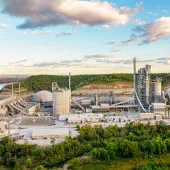GGBS milestone for Hanson UK at Hinkley Point C

Company delivers 10,000th load of Regen GGBS cement replacement to nuclear power station project
THE 10,000th load of Hanson’s Regen GGBS has been delivered to the Hinkley Point C nuclear power station construction site in Somerset. The material is helping to enhance the project’s low-carbon credentials before it begins operations to supply some 6 million homes with low-carbon electricity.
Regen GGBS (ground granulated blast-furnace slag) – a replacement product for some of the normal Portland cement content in concrete – can significantly reduce the environmental impact of a project as it cuts the CO2 emissions associated with concrete whilst helping to conserve natural resources for future generations.
Since 2014, more than 230,000 tonnes of Regen GGBS have been supplied to EDF’s contractors from the company’s Port Talbot site in South Wales. This is sampled and checked at a dedicated on-site testing laboratory at Port Talbot and again on delivery to the Hinkley Point C site to ensure it meets with the exacting technical specifications required before being used to make concrete for the project.
According to Hanson, the addition of Regen GGBS into the concrete mix provides a more sustainable alternative to other cement substitutes, such as fly ash, as it reduces the amount of embodied CO2. Using just one tonne of Regen GGBS in the concrete is said to cut embodied CO2 by around 850kg, compared with using one tonne of Portland Cement, making it less impactful on the environment.
Stewart Cameron, head of nuclear operations at Hanson UK, said: ‘Around 200,000 tonnes of CO2 has been saved in reaching this milestone 10,000th Regen GGBS load. It is a credit to all those involved as we continue to meet the standards expected of this high-profile project.’
As well as Regen GGBS, Hanson have also supplied other raw materials to the project. To date, the company has produced just over 1 million cubic metres of concrete from the client’s on-site batching plants and provided 5 million tonnes of aggregates, 443,000 tonnes of marine sand, 171,000 tonnes of cement, and 150,000 tonnes of asphalt.









